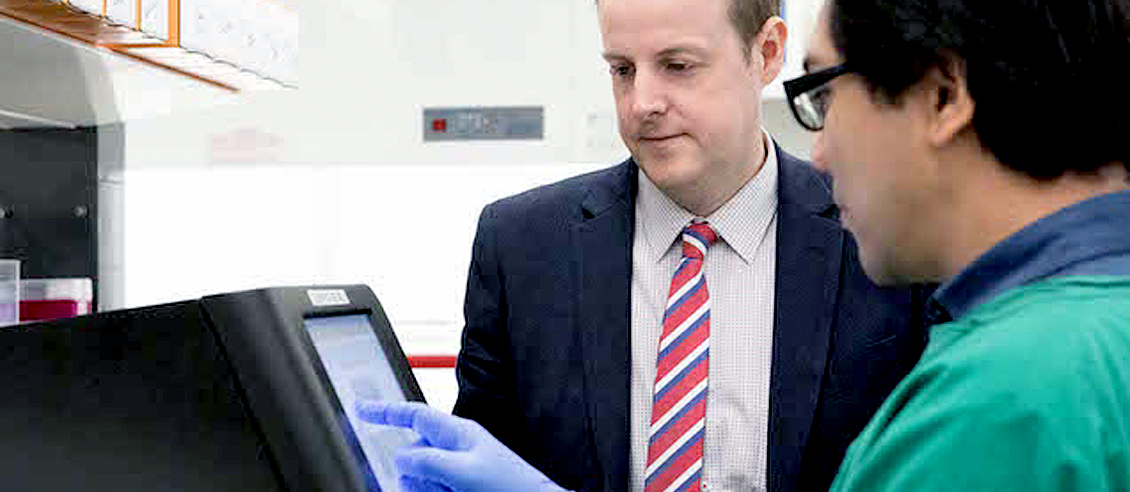Pilot program will use gene testing to guide chronic lymphocytic leukaemia treatment

People diagnosed with chronic lymphocytic leukaemia (CLL) will be tested for two gene mutations in a new pilot program to determine whether they will benefit from standard chemotherapy or novel therapies.
Under the program at Peter MacCallum Cancer Centre’s molecular haematology laboratory in Melbourne, 240 patients aged 70 or under will be tested for mutations in the gene TP53 and immunoglobulin heavy chain (IGHV) via next generation sequencing technology.
Between 5% and 10% of the 1000 people newly diagnosed each year with CLL will have TP53 mutation and approximately 50% of those requiring treatment will have a mutated IGHV gene.
For patients with mutated TP53 or unmutated IGHV the standard FCR chemotherapy protocol (fludarabine, cyclophosphamide and rituximab) is significantly less effective, and may actually make the disease worse by inducing further genome instability, explains Dr Piers Blombery, a consultant haematologist at Peter Mac who is leading the program.
The median duration of remission for patients without TP53 mutations and a mutated IGHV can be four to five years or longer, while the median remission time for patients with TP53 mutations is less than one year, Dr Blombery told the limbic.
“FCR can have significant side effects and therefore we need to carefully choose the patients who are going to benefit most from it. It is very effective for some patients but if you’re not going to benefit from it you should have other treatments which we now have access to.”
These are two new classes of drugs: the BTK inhibitor ibrutinib and the BCL-2 inhibitor venetoclax developed in Melbourne, he said, noting that as novel therapies they have unknown long-term side effects.
“This testing can provide a complete paradigm shift in a patient’s treatment. Previously a patient may have received six months of FCR chemotherapy and if they had a TP53 mutation the odds are they wouldn’t have achieved remission at the end of treatment and if they did the disease would most likely progress in a matter of months. Then they may have had more chemotherapy with similarly limited efficacy.
“Whereas now if you know the patient has a TP53 mutation up front, ineffective chemotherapy can be avoided and patients can be prioritised for access to these novel agents on clinical trials which are profoundly more effective at treating their disease.
“If a stem cell transplant is required then this can be performed in a more controlled fashion rater than in a patient that has had the cumulative side effects of multiple rounds of chemotherapy.”
The two tests in the pilot cost up to $1000 to perform, but will be given free to patients involved in the program.
The program findings are likely to help back a case for Medicare funding, Dr Blombery said, noting that new guidelines published this year in the journal Blood suggest testing for P53 and IGH should be standard of care for all patients with CLL “because it has such a profound effect on their treatment choice”.
“We really think this is an important test for people to have access to. Currently there is very limited reimbursement for molecular testing in any blood cancers which is a big problem”.
Foundation director, consultant haematologist Professor Miles Prince, said while genomic testing is now routinely used for diagnosis in blood cancers, its use to target treatment through the detection of biomarkers in Australia is still very limited.
“Ultimately, when we look at how we are going to utilise high cost drugs, if we can find biomarkers to find the patients who are going to or are not going to benefit, we start to obviously make the pharmaco-economic argument,” said Professor Prince, who is director of Cancer Immunology at Epworth and Director for the Centre for Blood Cell Therapies at Peter Mac.
“A flip side is also the toxicity. What’s happening in CLL with the use of biomarkers we are going to see more and more of it. The difficulty is getting access to it.”
The funding was provided by the Christine and Bruce Wilson Centre for Lymphoma Genomics, which is based in the Molecular Haematology Laboratory at Peter Mac, with support from the Snowdome Foundation.
By Tessa Hoffman The Limbic
30 May 2018
